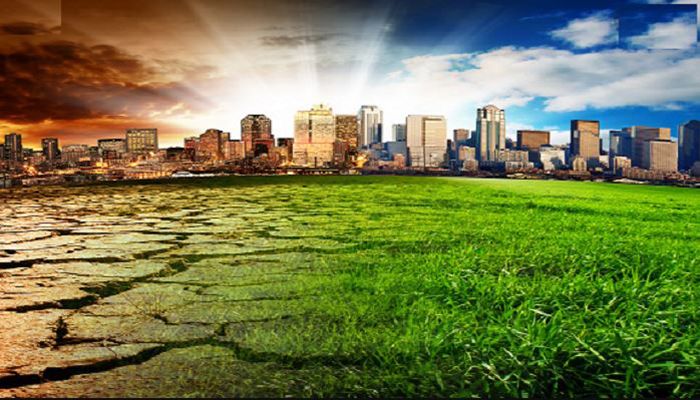
Desk Report
Publish: 19 May 2021, 08:33 pm

Air density in two of Dhaka's most marginalized low-income slums is four to five times higher than Bangladesh's permission cap for 24 hours.
As a result, people suffer from air pollution-related diseases such as laryngitis, asthma, and bronchitis, reports UNB.
During its virtual launch and discussion event on Wednesday, a study report titled ''Urban Localized Pollution in the Context of Climate Change'' revealed such detail.
According to the study report, earthen stoves for cooking, which use biomass as fuel, are the main source of indoor air pollution in both marginalized areas. Women are the ones that suffer the most from air pollution because they are exposed to smoke for long periods of time while cooking.
The research was conducted in two Dhaka South City Corporation (DSCC) slums: Dholpur Citypolli and Dhaka Match Colony, Shyampur.
It focused on four issues- water supply, sanitation, indoor air pollution, and solid waste management.
Many air-polluting industries surround these low-income settlements, including steel mills, plastic factories, melamine factories, and brick kilns, among others.
The research was conducted under ‘The Featuring Green Earth Project’, which is jointly implemented by Plan International Bangladesh, Bangladesh Youth Environmental Initiative (BYEI) and Population Services and Training Center (PSTC).
The project initiated the research in collaboration with the Department of Urban and Regional Planning (URP), BUET and the International Centre for Climate Change and Development (ICCCAD).
The research took place between December 2020 and January 2021, and it used a hybrid approach that included both qualitative and quantitative data.
Professor Afsana Haque of BUET's Department of Urban and Regional Planning (URP) and Sarder Shafiqul Alam of ICCCAD's Coordinator shared the results of their research in the event.
Afsana Haque, citing a UNICEF study report, stated that there are approximately 4 million people living in 5,000 slums where meeting basic needs and services is a huge challenge for this community and that climate change has made their situation more complicated.
Under this research, the Center for Atmospheric Pollution Studies (CAPS), Stamford University Bangladesh tested water and air of the research areas.
According to the CAPS team's air quality survey, PM2.5 and PM10 levels are four to five times higher than the Bangladesh normal acceptable limit for 24 hours (116.96 g/m3 and 164.71 g/m3 in Dholpur and 83.96 g/m3 and 155.50 g/m3 in Dhaka Match Colony, respectively).
According to the national guideline of Bangladesh, the standard is 2.5 µg/m3 and 10 µg/m3.
In both study areas, the CAPS water test report shows that the sample water is polluted with foreign particles exceeding normal limits.
In the water, they discovered E. Coli (seven or more) and "uncountable colonies of complete coliform." In the study areas, the Biological Oxygen Demand (BOD5) and Chlorine concentrations were found to be excessive.
Residents in both study areas have long faced a slew of water-related issues, including far-flung water sources, scarcity, and low quality.
They also revealed some health and socio-cultural issues related to water availability. Both supply lines and deep tub wells are used as water sources in the study areas.
However, water is only available for a short time and is often interrupted. To collect water, most women must walk for 5-10 minutes.
They must queue for one and a half to two hours to collect water. Households pay Tk 400-500 per month on average. Despite this, they do not have access to safe drinking water.
According to international guidelines, a family should have one sanitary toilet. However, according to the Bangladeshi government, households can use either "shared latrines" or "group latrines," with a limit of two households (or 10 people) per latrine.
In both slums, however, the number of families sharing a single toilet is well below the set Basic Minimum Service Level (BSML) in every way. On average, three to four families share one bathroom (15-20 persons).
According to the study report, women's privacy and safety are major concerns due to inadequate sanitation facilities, which stem from the study's remote location, architecture, and sharing of toilets.
The virtual ceremony's chief guest was Md Tazul Islam MP, Minister of Local Government, Rural Development, and Cooperatives.
The Minister said in his speech that Bangladesh's per capita income has risen. We will be a middle-income nation by 2030. Challenges that arise as a result of such accomplishments must be discussed, and appropriate steps must be taken.
He said that raising awareness is the most important need, and that awareness must be ensured at all levels of society. Initiatives led by the community should be welcomed.
To solve the issues of waste management, water supply, and water and air pollution, the public, non-profit, and private sectors must come together and collaborate.
Tazul Islam said it has to be decided at first that how many people can live in the city.
"Along with this, policy initiatives need to ensure. The living standard of rural areas has to be increased as well as creating more job opportunities. This might be difficult but this is a pressing need. Different services charge for all classes of people needs to be determined based on their capacity following equity. Recycling and reusing waste materials have to be done with proper maintenance for planned waste management. The Government is already working for producing electricity by waste."
Subscribe Shampratik Deshkal Youtube Channel
Topic : Climate crisis Urban population
© 2024 Shampratik Deshkal All Rights Reserved. Design & Developed By Root Soft Bangladesh